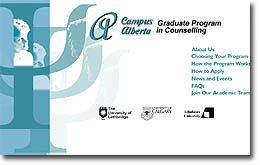 Many Voice readers have asked me to write more about my experiences as a graduate student. Now that I’ve successfully completed my first year, one of the best phrases I can think of to sum up the experience is – extremely busy!
Many Voice readers have asked me to write more about my experiences as a graduate student. Now that I’ve successfully completed my first year, one of the best phrases I can think of to sum up the experience is – extremely busy!
I thought things were hectic when I was enrolled in full time undergraduate studies, working three jobs, and putting in more than full time hours as a very busy president of the students’ union. Little did I know. I had it easy back then! Graduate studies are much more time consuming than I ever expected, and this past year has been the busiest, most stressful one so far. At the same time, it has been the most rewarding.
Why busy? There are several reasons. I think the main one is the Master of Counselling course structure itself. Gone are the undergraduate option of course extensions. In certain circumstances you can request a short assignment extension from the individual course professors, but if these are not granted, marks are deducted for any late submissions. Each course has a set start and end time, and each assignment has a specific deadline. Weekly tasks must be completed by each Tuesday midnight, including a specific number of discussion forum postings. These are not simple postings. We are required to complete the assigned readings, then answer specific questions with referenced responses, including citations in APA format. These “scholarly” postings require reflection and preparation, and not only must we answer the questions, we must read all the contributions of classmates and engage in a dialogue, responding with thoughtful, well-referenced commentaries. Ideally these comments begin before the weekend, then are spaced out over the next few days to participate in an ongoing discussion. Forum postings can easily take at least one hour daily. If postings are late or if we do not meet the minimum number of required posts, marks are lost.
This cycle leaves you feeling endlessly rushed and on edge. Every Wednesday morning I breathe a sigh of relief that I’ve completed the previous week’s work. I spend a few days getting caught up with everything else, but then often find myself already into the weekend before I even start the current week’s tasks. During weeks when a course assignment is due, the workload is much higher. My experience thus far has been that each assignment has been comparable to a major undergrad final assignment (the kind worth 40-50 percent of your mark), and I spend from fifteen to thirty hours on each. Given that each course has anywhere from four to six assignments, the hours can really add up. The course coordinators suggest that graduate students can expect to spend 12-15 hours a week, but I have found this to be a low estimate.
Another factor in keeping you busy is the need to interact with other graduate students. Each course attempts to incorporate a minimum level of collaboration with others, in addition to the forum postings. Assignments can be done with partners or in small groups, and managing these at a distance is a challenge. My last course required a significant number of group projects, and several hours a week were spent just communicating with partners on these. One major assignment was done in groups of four. Most of the students in the program are new to distance learning and may have never completed a group assignment at a distance. In my group, we had other challenges. One individual was travelling for work, another was in the process of moving to another province, and one’s computer crashed the day before the assignment was due. Trying to coordinate schedules to meet the deadline was a nightmare, compounded by trying to work with varied personalities that were not always compatible. By the time we finished emailing and phoning each other non-stop for several days, we got it done, but it felt like the assignment from hell!
Graduate assignments that require partnerships are much harder and more time consuming, and because marks are dependent on the input of classmates, this adds to the overall stress. Although there are many differences, most of AU’s graduate programs follow a similar format, and are equally as structured. I was talking with a grad student in the MBA program, and she commented that group assignments can be extremely challenging because fellow students are mature individuals well along in their careers. They are often managers who are used to giving directions to others, not working collaboratively in a give-and-take situation. She related her experience working on one group assignment with five leaders and no followers – everyone trying to be in charge! Fortunately they were able to recognize the problem and see the humour in the situation, but it added to the stress and challenge of getting the work done.
I’ve heard some undergrad students suggest that a greater collaboration and interaction with fellow students in coursework would be desirable. I’m not sure I agree. Undergrad courses are designed differently, and the freedom to work at your own pace should not be undervalued. Although I enjoy working with my classmates and find it intellectually stimulating, it is certainly easier to complete assignments on my own.
As difficult and time-consuming as they are, graduate studies are immensely satisfying. The feeling of being able to do research, to feel like you are in a position where what you contribute might make a difference in the world, is extremely exciting and stimulating. When I submitted my literature review assignment it felt like a moment I had been waiting for all my life. I’ve actually completed one part of what will eventually become my master’s “thesis” and the sense of accomplishment was incomparable. The work I will finally submit at the end of my course will become part of the worldwide body of scholarly literature, and this is one of the most important aspects of grad studies as far as I’m concerned.
The material we are studying is also extremely interesting, and we are expected to approach our learning with a depth of critical thinking that is far beyond that required at the undergraduate level. As an undergrad student, I often felt that I was expected to parrot what I had gleaned through the readings, and I was not really encouraged to go far beyond the course material. As a grad student, the reverse is true. Finding an answer to questions posed in the lesson can require a comprehensive search through a wide variety of materials beyond the course texts, and we are expected to put our own ideas and experiences into responses. Although this is time consuming, it’s also very satisfying. We are free to take a topic of interest (as long as it is related to the course) and explore it. For example, last summer I took a negative work experience and turned it into an ethics analysis assignment – an exercise that provided some emotional healing (and a pretty good mark too!). There is a level of freedom that we did not have as undergrads, and it is liberating. The down side is that we are presented with so much interesting material and we have so little time. I often find myself wishing I had much more time to spend researching a particular topic, and I leave each course behind regretting that I’ve not been able to completely explore every aspect of it.
I know there are many undergrad students approaching graduation who are curious about what it is all about, and wondering if they would be able to meet the challenges of graduate studies. Academic expectations, of course, are high. As an open university, AU admits students on the basis of a variety of criteria, but if you do not have an adequate educational or professional background, you will not survive grad studies. That said, if you have done well in undergrad studies, you will do well as a graduate student.
If you are considering it, I’d strongly encourage you to do the best you can to prepare yourself in advance. Consider it a full-time job, one that will need your complete attention and focus over the next two or three years. Don’t underestimate how much time and energy it will need, because you will just set yourself up for failure. Do everything you can to arrange your affairs so that you can place your studies as a priority, and if at all possible, try to ensure you have a long-range financial plan in place to pay for your schooling. At the same time, if it is what you want, then don’t hesitate. If you are motivated and ready to make some sacrifices, things will fall into place.
The time commitment needed for grad studies, however, has taken its toll on me. I’ve had to drop many activities that I can no longer accommodate, and writing every week for the Voice is one of them. I love writing for the Voice and do not want to stop, but it’s very difficult to find time and focus to maintain my writing involvement, and I’ve had to drop my column down to twice monthly. Of course, there are other situations I have no control over, and as noted some weeks ago, the reality of my financial situation means I must work long hours to fund my studies. Even with dropping many of my activities, I still have way too much on my plate, and my health has suffered – including a frightening wake-up call just before Christmas. So far, however, the benefits far outweigh the negatives and in spite of the difficulties, I’m loving every minute. It is one of the most satisfying and rewarding things I have ever done.


